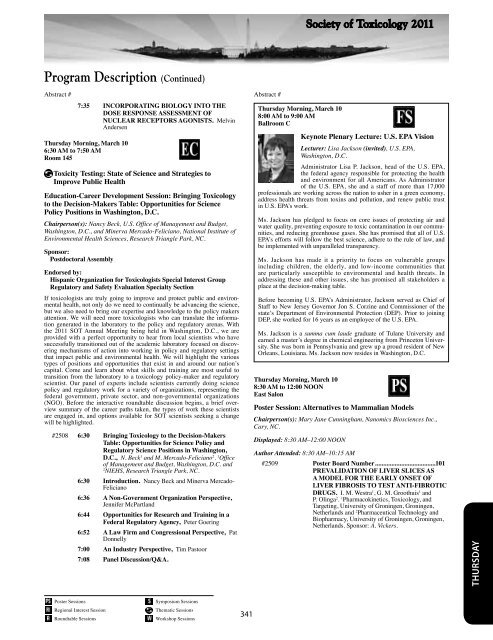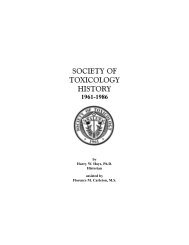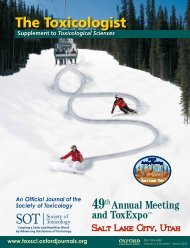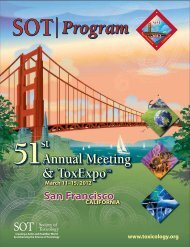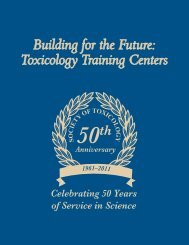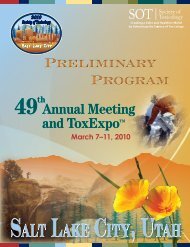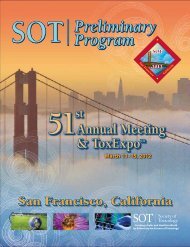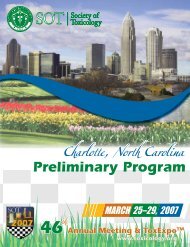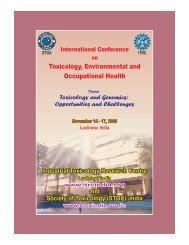Program - Society of Toxicology
Program - Society of Toxicology
Program - Society of Toxicology
You also want an ePaper? Increase the reach of your titles
YUMPU automatically turns print PDFs into web optimized ePapers that Google loves.
<strong>Society</strong> <strong>of</strong> <strong>Toxicology</strong> 2011<br />
<strong>Program</strong> Description (Continued)<br />
Abstract #<br />
7:35 INCORPORATING BIOLOGY INTO THE<br />
DOSE RESPONSE ASSESSMENT OF<br />
NUCLEAR RECEPTORS AGONISTS. Melvin<br />
Andersen<br />
Thursday Morning, March 10<br />
6:30 AM to 7:50 AM<br />
Room 145<br />
Toxicity Testing: State <strong>of</strong> Science and Strategies to<br />
Improve Public Health<br />
Education-Career Development Session: Bringing <strong>Toxicology</strong><br />
to the Decision-Makers Table: Opportunities for Science<br />
Policy Positions in Washington, D.C.<br />
Chairperson(s): Nancy Beck, U.S. Office <strong>of</strong> Management and Budget,<br />
Washington, D.C., and Minerva Mercado-Feliciano, National Institute <strong>of</strong><br />
Environmental Health Sciences, Research Triangle Park, NC.<br />
Sponsor:<br />
Postdoctoral Assembly<br />
Endorsed by:<br />
Hispanic Organization for Toxicologists Special Interest Group<br />
Regulatory and Safety Evaluation Specialty Section<br />
If toxicologists are truly going to improve and protect public and environmental<br />
health, not only do we need to continually be advancing the science,<br />
but we also need to bring our expertise and knowledge to the policy makers<br />
attention. We will need more toxicologists who can translate the information<br />
generated in the laboratory to the policy and regulatory arenas. With<br />
the 2011 SOT Annual Meeting being held in Washington, D.C., we are<br />
provided with a perfect opportunity to hear from local scientists who have<br />
successfully transitioned out <strong>of</strong> the academic laboratory focused on discovering<br />
mechanisms <strong>of</strong> action into working in policy and regulatory settings<br />
that impact public and environmental health. We will highlight the various<br />
types <strong>of</strong> positions and opportunities that exist in and around our nation’s<br />
capital. Come and learn about what skills and training are most useful to<br />
transition from the laboratory to a toxicology policy-maker and regulatory<br />
scientist. Our panel <strong>of</strong> experts include scientists currently doing science<br />
policy and regulatory work for a variety <strong>of</strong> organizations, representing the<br />
federal government, private sector, and non-governmental organizations<br />
(NGO). Before the interactive roundtable discussion begins, a brief overview<br />
summary <strong>of</strong> the career paths taken, the types <strong>of</strong> work these scientists<br />
are engaged in, and options available for SOT scientists seeking a change<br />
will be highlighted.<br />
#2508 6:30 Bringing <strong>Toxicology</strong> to the Decision-Makers<br />
Table: Opportunities for Science Policy and<br />
Regulatory Science Positions in Washington,<br />
D.C., N. Beck 1 and M. Mercado-Feliciano 2 . 1 Office<br />
<strong>of</strong> Management and Budget, Washington, D.C. and<br />
2<br />
NIEHS, Research Triangle Park, NC.<br />
6:30 Introduction. Nancy Beck and Minerva Mercado-<br />
Feliciano<br />
6:36 A Non-Government Organization Perspective, <br />
Jennifer McPartland<br />
6:44 Opportunities for Research and Training in a<br />
Federal Regulatory Agency, Peter Goering<br />
6:52 A Law Firm and Congressional Perspective, Pat<br />
Donnelly<br />
7:00 An Industry Perspective, Tim Pastoor<br />
7:08 Panel Discussion/Q&A.<br />
Abstract #<br />
Thursday Morning, March 10<br />
8:00 AM to 9:00 AM<br />
Ballroom C<br />
Keynote Plenary Lecture: U.S. EPA Vision<br />
Lecturer: Lisa Jackson (invited), U.S. EPA,<br />
Washington, D.C.<br />
Administrator Lisa P. Jackson, head <strong>of</strong> the U.S. EPA,<br />
the federal agency responsible for protecting the health<br />
and environment for all Americans. As Administrator<br />
<strong>of</strong> the U.S. EPA, she and a staff <strong>of</strong> more than 17,000<br />
pr<strong>of</strong>essionals are working across the nation to usher in a green economy,<br />
address health threats from toxins and pollution, and renew public trust<br />
in U.S. EPA’s work.<br />
Ms. Jackson has pledged to focus on core issues <strong>of</strong> protecting air and<br />
water quality, preventing exposure to toxic contamination in our communities,<br />
and reducing greenhouse gases. She has promised that all <strong>of</strong> U.S.<br />
EPA’s efforts will follow the best science, adhere to the rule <strong>of</strong> law, and<br />
be implemented with unparalleled transparency.<br />
Ms. Jackson has made it a priority to focus on vulnerable groups<br />
including children, the elderly, and low-income communities that<br />
are particularly susceptible to environmental and health threats. In<br />
addressing these and other issues, she has promised all stakeholders a<br />
place at the decision-making table.<br />
Before becoming U.S. EPA’s Administrator, Jackson served as Chief <strong>of</strong><br />
Staff to New Jersey Governor Jon S. Corzine and Commissioner <strong>of</strong> the<br />
state’s Department <strong>of</strong> Environmental Protection (DEP). Prior to joining<br />
DEP, she worked for 16 years as an employee <strong>of</strong> the U.S. EPA.<br />
Ms. Jackson is a summa cum laude graduate <strong>of</strong> Tulane University and<br />
earned a master’s degree in chemical engineering from Princeton University.<br />
She was born in Pennsylvania and grew up a proud resident <strong>of</strong> New<br />
Orleans, Louisiana. Ms. Jackson now resides in Washington, D.C.<br />
Thursday Morning, March 10<br />
8:30 AM to 12:00 NOON<br />
East Salon<br />
Poster Session: Alternatives to Mammalian Models<br />
Chairperson(s): Mary Jane Cunningham, Nanomics Biosciences Inc.,<br />
Cary, NC.<br />
Displayed: 8:30 AM–12:00 NOON<br />
Author Attended: 8:30 AM–10:15 AM<br />
#2509 Poster Board Number.....................................101<br />
PREVALIDATION OF LIVER SLICES AS<br />
A MODEL FOR THE EARLY ONSET OF<br />
LIVER FIBROSIS TO TEST ANTI-FIBROTIC<br />
DRUGS. I. M. Westra 1 , G. M. Groothuis 1 and<br />
P. Olinga 2 . 1 Pharmacokinetics, <strong>Toxicology</strong>, and<br />
Targeting, University <strong>of</strong> Groningen, Groningen,<br />
Netherlands and 2 Pharmaceutical Technology and<br />
Biopharmacy, University <strong>of</strong> Groningen, Groningen,<br />
Netherlands. Sponsor: A. Vickers.<br />
Thursday<br />
Poster Sessions<br />
Regional Interest Session<br />
Roundtable Sessions<br />
Symposium Sessions<br />
Thematic Sessions<br />
Workshop Sessions<br />
341


